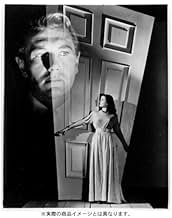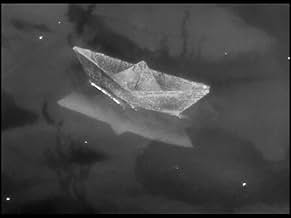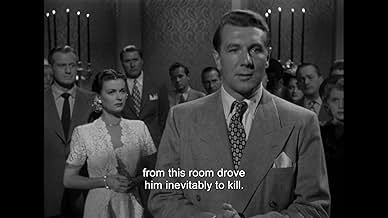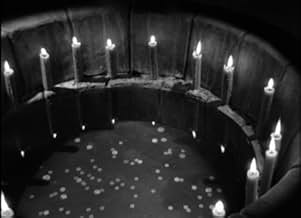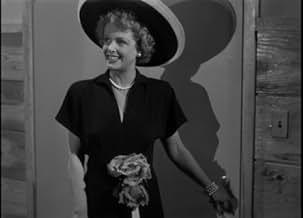After a lovely woman and her new husband settle in an ancient mansion on the East coast, she discovers that he may want to kill her.After a lovely woman and her new husband settle in an ancient mansion on the East coast, she discovers that he may want to kill her.After a lovely woman and her new husband settle in an ancient mansion on the East coast, she discovers that he may want to kill her.
- Altar Boy
- (uncredited)
- Townsman
- (uncredited)
- Sarah
- (uncredited)
- Guest in Home Tour
- (uncredited)
- Guest in Home Tour
- (uncredited)
- Judge
- (uncredited)
- Small Mexican Knife Fighter
- (uncredited)
- Country Squire
- (uncredited)
- Director
- Writers
- All cast & crew
- Production, box office & more at IMDbPro
Featured reviews
Fritz Lang's bleak cinematography and haunting use of music help to create the atmosphere that a story of this nature needs in order to work effectively. The focus on the door helps to create the tension as to what the secret is throughout the movie, and Fritz Lang seems keen to capitalise on that as we see Joan Bennett's narration change from how she feels personally to driving herself crazy as she tries to decipher what's behind the door. The characters in the story are interesting, and they need to be as this film is mostly character based. We follow Celia Lamphere, and we are given her thoughts by way of the aforementioned narration. Narration is often found in scripts that have been written by people that don't know how to write good scripts. However, in this case it actually helps the film to move along. In order for the story to work, we need to know what the character is feeling, so in this case narration is helpful to the story.
As I've mentioned, the ending isn't all that good, but the suspense builds nicely and there's much to like about this film. If you're new to Fritz Lang, though, I certainly recommend the classics 'M' and 'Metropolis' before this, and also from his American films; 'Fury', 'Scarlet Street', 'Beyond a Reasonable Doubt' and 'While the City Sleeps' get my thumbs up.
Why would Joan marry and stay with someone so utterly stiff and charmless as Michael Redgrave?? The male lead should have been given to someone more mysterious and attractive. They were hoping for a new Laurence Olivier...
Joan is a treat as always. I love how she comes across as a spoiled debutante who can hardly care to utter her lines with any conviction. She´s a good actress -just a bit too laid back at times. I love her, she is so stunningly beautiful and cool in her Hollywood wardrobes.
I love the whole atmosphere of the movie. It´s slow at first and then from the honeymoon in Mexico and forward so mysterious! I love her bedroom with the tapestry! The thing with the room-collecting was quite farfetched but fun. Who would REALLY aquire complete scenes of murders at home???? I´m going to see it again soon and learn some lines. They don´t make them like they used to!
Dazzling Hitch/style suspense movie about a beautiful woman marries a rare man with a shock revelation around every corner their mansion . It packs hallucination , treason , Bennett plays a rich wife trying to help her hubby , well played by Michael Redgrave , who is suffering from amnesia and who might be a murderer too . The picture takes elements from classic Hitchcock films , carrying out a crossover among ¨Suspicion ¨, ¨Spellbound¨ and ¨Rebeca¨ . In fact ,Fritz Lang's attempt to do his version of Rebeca (1940) was a project fraught with disaster. It ran over budget and over schedule, while Lang was at constant loggerheads with his leading lady, Joan Bennett . As it stars the great Joan Bennett , being compellingly directed by Lang ; but it is not as outstanding as their former movies together : ¨Man hunt¨, ¨The woman in the window¨ and ¨Scarlet street¨. Support cast is pretty good such as Anne Revere as Caroline Lamphere , Barbara O'Neil as Miss Robey and Paul Cavanagh as Rick Barrett .
Atmospheric as well as mistly cinematography in black and white by Stanley Cortez . Thrilling and frightening musical score by the classic Miklos Rozsa . The motion picture was professionally directed by Fritz Lang . Lang directed masterfully all kind of genres as Noir cinema as ¨Big heat , Scarlet Street and Beyond a reasonable doubt¨ , Epic as ¨Nibelungs¨, suspense as ¨Secret beyond the door, Clash by night¨ , Western as ¨Rancho Notorious and Return of Frank James ¨ and of course Adventure as ¨Moonfleet¨ .
Being the 40's the Freudian overtones are overpowering, as the husband, Michael Redgrave in his first Hollywood role, seems to be over-reacting to years of unhealthy female influence and dominance in his life as his mood swings like, well, I guess you'd say, a door.
In the background there's an apparently disfigured housekeeper Miss Robey, Redgrave's supportive sister and his difficult, moody son but the main tension is between the leads as it builds gradually to a fiery ending.
The plot may creak at times like an old floorboard, Redgrave and Bennett are somewhat stiff and cold in their parts and the continuity isn't all it could be, but if like me you like film noir settings then this is for you too. Thus we get Bennett's interior monologues, lots of shots of her in front of mirrors, lots of scenes with darkened doors and symbolic keys, and even a shroud-like mist followed by a thunderstorm on the climactic night. There are some great shots of starkly-lit corridors and a wonderfully imaginative dream sequence (yes, it has those too) of Redgrave's where he's prosecuting himself in front of a judge and jury whose faces are in shadow. Dmitri Tiompkin's atmospheric score adds a lot to the overall mystery and dread, particularly at the end.
This may not be Lang's best American film but there was more than enough in it to keep an avowed fan like me keenly watching.
Joan Bennett plays Celia, a young lady who acquires a large amount of money after her brother's death and decides to take a holiday. It is here that she meets Mark Lamphere (Michael Redgrave), a mysterious and charming gentleman who excites in Celia intense suppressed feelings of rebellion and exhilaration. Following their marriage, a hastily-decided proposition that can only lead to trouble, Celia immediately begins to notice peculiarities in her new husband, and, after her arrival at Mark's extravagant residence, she finds the dwelling haunted by the shadow of his previous wife. Mark, it seems, houses an unhealthy preoccupation with murder, and has made a hobby out of collecting entire rooms in which unspeakable atrocities of passion were committed. But what of the one room that is kept securely locked, never to be opened by anyone? Celia concludes that the secret to unlocking the inner depths of her husband's disturbed mind lies within that single room, beyond the forbidden door. Though Silvia Richards' screenplay, from a story by Rufus King, often seems too incredible to take seriously, Lang's film remains an interesting achievement, and is nothing if not entertaining.
I found the promotional material for 'Secret Beyond the Door' to be grossly misleading. The image of Joan Bennett standing before a significantly-distorted door prompted me to expect a film of extreme German Expressionism, in the same vein as 'The Cabinet of Dr. Caligari (1920).' Fritz Lang, who developed his career in Germany during the 1920s, and having often used elements of the style, would presumably have been very adept at recreating the devilishly-twisted labyrinths of the human mind, but the only scene to even approach my stylistic expectations was the appropriately ambiguous and shadowy dream sequence, in which Michael Redgrave both prosecutes and defends his malevolent tendencies in court {this particular scene may even have influenced Hitchcock's heavily-stylised courtroom trial in 'Dial M for Murder (1954)}. The remainder of the film has the appearance of a typical 1940s film noir, with suitably shadowy cinematography by Stanley Cortez, supplemented by a voice-over by Joan Bennett. Also note the similarity between the character of Miss Robey (Barbara O'Neil) and Mrs. Danvers (Judith Anderson) from 'Rebecca,' most particularly in their respective final actions in each picture.
Did you know
- TriviaThe grove of trees through which Celia (Joan Bennett) runs when she flees the house is the same grove through which the Wolf Man ran in Le Loup-garou (1941), also made by Universal. In particular, the tree, against which she leans, is the same one under which the Wolf Man was beaten.
- GoofsWhen Celia takes an impression of the key in wax, she only takes the impression on one side, which would render the key made from that impression useless without the reverse side.
- Quotes
Mark Lamphere: You were living that fight. You soaked it all in - love, hate, the passion. You've been starved for feelings - any real feelings. I thought: 20th Century Sleeping Beauty. Wealthy American girl who has lived her life wrapped in cotton wool but she wants to wake up. Maybe she can.
Celia Barrett: Is it as hard as all that?
Mark Lamphere: Most people are asleep.
- ConnectionsFeatured in Vampira: Secret Beyond the Door... 1947 (1956)
- How long is Secret Beyond the Door...?Powered by Alexa
Details
- Release date
- Country of origin
- Languages
- Also known as
- Secret Beyond the Door...
- Filming locations
- Production company
- See more company credits at IMDbPro
Box office
- Budget
- $1,500,000 (estimated)
- Runtime
- 1h 39m(99 min)
- Color
- Aspect ratio
- 1.33 : 1


